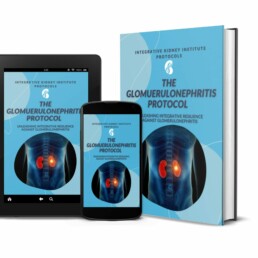As we delve deep into countless medical journals to uncover the latest on Integrative Medicine’s approach to kidney health, we are always reminded of the value of your time. Our commitment remains steadfast in curating and succinctly summarizing these vital studies for you. Welcome to the April Research and News.
Can Time-Restricted Eating Slow Kidney Disease Progression in ADPKD Patients?
In a pioneering study published in the Clinical Kidney Journal by Cortney Steele et al., researchers explored the impact of time-restricted eating (TRE) on autosomal dominant polycystic kidney disease (ADPKD).
This 12-month randomized trial compared the effects of TRE, where participants ate within an 8-hour window daily, against a control group receiving general healthy eating advice without time restrictions. The study assessed adherence rates, changes in total kidney volume measured by MRI, and weight changes among 29 participants.
Results indicated modest weight loss in both groups, with no significant differences in kidney volume change between TRE and control groups, suggesting that weight and adiposity reductions might be more influential in managing kidney disease progression than the specific timing of meals.
Why this is important:
This study highlights the potential and limitations of dietary timing as a therapeutic strategy in managing ADPKD. While TRE did not achieve significant improvements over general healthy eating advice in terms of kidney volume, the observed weight loss associated with both diets suggests that broader dietary and lifestyle modifications might play a crucial role in slowing disease progression.
These findings open avenues for further research to explore how different dietary strategies can be optimized for better health outcomes in ADPKD patients, emphasizing the importance of personalized dietary interventions.
One major critique of this study is its short-term duration while ADPKD has progressed over the decades.
Revitalizing Renal Health: High-Intensity Interval Training as a Preventive Strategy Against CKD in Older Adults
A groundbreaking study conducted by Hallan et al. explores the under-researched area of physical exercise’s impact on kidney function, particularly in older adults.
This randomized clinical trial, derived from the Generation 100 Study in Trondheim, Norway, assessed the efficacy of different exercise intensities in preserving kidney function over five years.
Participants, aged 70-77, engaged in either moderate-intensity continuous training, high-intensity interval training (HIIT), or followed standard physical activity guidelines.
Results strikingly indicated that HIIT significantly reduced the risk of rapid kidney function decline compared to the control group, showcasing a potential preventive measure for chronic kidney disease (CKD) akin to its benefits in cardiovascular health.
Why this is important:
As CKD emerges as a significant global health concern, particularly among aging populations, understanding and mitigating its risk factors is crucial. This study highlights physical exercise, specifically high-intensity interval training, as a potent, non-pharmacological intervention that can substantially reduce the progression of CKD.
These findings suggest that integrating targeted exercise regimens could enhance longevity and quality of life by preserving kidney function, potentially shifting public health approaches toward more proactive, lifestyle-oriented strategies in managing CKD risk.
Silent Stones: The Impact of Asymptomatic Kidney Stones on Disease Progression in ADPKD
In a study published in BMC Nephrology, researchers investigated the influence of asymptomatic kidney stones on disease progression in patients with autosomal dominant polycystic kidney disease (ADPKD).
This retrospective cohort study followed 195 ADPKD patients, distinguishing between those with nephrolithiasis (85 patients) and those without (110 patients). The study aimed to understand the relationship between nephrolithiasis and the rate of kidney function decline, measured by changes in the estimated glomerular filtration rate (ΔeGFR).
Results indicated a significantly greater decline in kidney function among patients with nephrolithiasis compared to those without. Furthermore, nephrolithiasis was found to be an independent predictor of faster kidney function decline, emphasizing the need for vigilant monitoring of kidney stones in ADPKD patients to potentially slow disease progression and preserve renal function.
Why this is important:
The findings underscore the clinical significance of asymptomatic nephrolithiasis in ADPKD, a condition previously considered only a minor complication relative to cyst development.
By demonstrating that nephrolithiasis contributes independently to faster kidney function decline, this study prompts a reevaluation of monitoring and management strategies for ADPKD patients.
It suggests that proactive detection and treatment of kidney stones, even when asymptomatic, could be crucial in delaying the progression to end-stage kidney disease, thus improving outcomes and quality of life for patients afflicted with this genetic disorder.
Furthermore, the study indicates that alkalinizing the urine with products such as potassium citrate or KetoCitra may have another role in slowing the progression of ADPKD.
Join us to end the kidney disease epidemic
Broadening Horizons: Effects of a High-Diversity Plant-Based Diet on CKD Patients’ Health and Gut Microbiome
In a pioneering study published in the Clinical Journal of the American Society of Nephrology, investigators explored the effects of a diverse plant-based diet on adults with stage 3-4 chronic kidney disease (CKD).
This randomized controlled trial compared the impacts of a high-diversity plant-based diet (HDPD, featuring over 30 unique plant foods weekly) and a low-diversity plant-based diet (LDPD, with fewer than 15 unique plant foods weekly), each followed for six weeks with a washout period in between.
Key findings included improvements in diet quality and significant reductions in uremic toxins among HDPD responders, particularly those with advanced CKD.
The HDPD also enhanced fecal microbiome diversity, increasing beneficial metabolites like butyrate, and decreased overall symptom burden, including constipation.
In contrast, the LDPD led to reduced microbial diversity and abundance. These results underscore the potential of a varied plant-based diet to ameliorate CKD symptoms and alter gut microbiota composition favorably.
Why this is important:
This study highlights the profound influence of dietary diversity on health outcomes in CKD patients, challenging traditional dietary restrictions often prescribed in CKD management.
By demonstrating that a varied plant-based diet not only manages but potentially improves various clinical and microbiological parameters, this research advocates for a paradigm shift towards more inclusive dietary guidelines in CKD care.
Such dietary strategies may provide a non-pharmacological approach to managing CKD progression and symptomatology, emphasizing the role of diet as a cornerstone of integrated disease management. This could significantly enhance patient quality of life and offer a customizable, accessible intervention to mitigate CKD progression.
Review article of the month
Efficacy of Risk Factor-Based Screening for Chronic Kidney Disease in Primary Care
This systematic open-access review evaluates the effectiveness of risk factor-based screening for early detection of chronic kidney disease (CKD) in adults in primary care settings, synthesizing evidence from 24 studies across 11 countries.
Utilizing varied screening methods like estimated glomerular filtration rate (eGFR), albumin-creatinine ratio (ACR), and dipstick urinalysis, the review highlights that such screenings can identify a significant percentage of individuals with previously undiagnosed CKD, with prevalence rates of reduced kidney function and confirmed CKD ranging from 2.9% to 56% and 4.4% to 17.1%, respectively.
The findings suggest increased patient referrals and satisfaction, although the review notes limitations such as the lack of a meta-analysis and limited generalizability to resource-poor settings. The authors call for future studies with robust designs and comprehensive interventions to enhance the effectiveness of CKD screening in primary care.
Join here to receive FREE monthly updates on the latest research in Integrative Nephrology and tips on managing kidney disease straight to your inbox.
We would love to hear your feedback. Let us know what you think of these educational materials and if you would like us to focus on specific topics. Please email us at info@inkidney.com.







